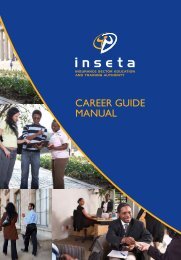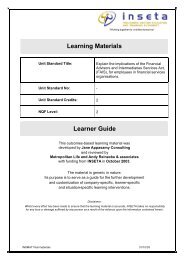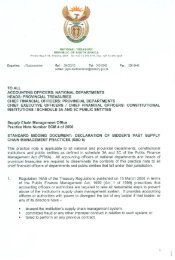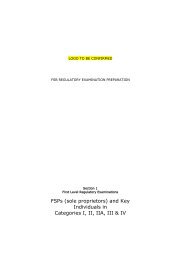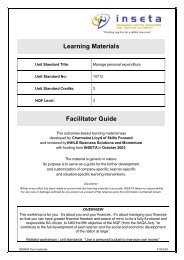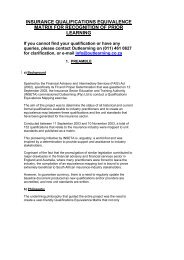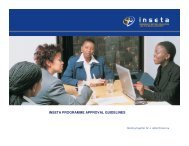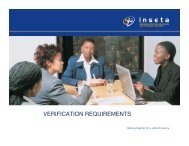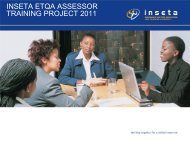SSP Brochure:Layout 1 - INSETA
SSP Brochure:Layout 1 - INSETA
SSP Brochure:Layout 1 - INSETA
You also want an ePaper? Increase the reach of your titles
YUMPU automatically turns print PDFs into web optimized ePapers that Google loves.
Third, respondents felt that the sector should address skills gaps by focusing skills development on the needs of the industry rather thanon company-specific needs. Incentives should be given to encourage the transfer of knowledge in smaller organisations. Finally they wereof the opinion that new legislation is positively impacting on the level of professionalism in the industry and the removal of skills gapsThe critical skills needs of specific occupational groups were identified during the Survey of Employment, Scarce and Critical Skills (2006).4.2.1 Critical skills: managersCritical skills gaps were identified mainly in managerial positions that require a combination of management skills and specialist knowledgein particular fields such as information technology, specific aspects of insurance and human resources.The identified skills gaps related to general managerial abilities, for example leadership and general management as well as to specialistknowledge such as insurance product knowledge and industry-specific knowledge. Managers also lacked skills in areas such as• sales and marketing;• information technology (advanced computer skills);• legislation pertaining to the industry;• communication.4.2.2 Critical skills: professionalsInsufficient product knowledge and a lack of knowledge of the insurance sector were regarded as major deficiencies in the skills makeupof professionals employed in the sector. Many professionals also lacked sales and marketing skills and were not adequately informed aboutinsurance-related legislation. Other skills gaps pertained to• communication;• information technology;• finance.4.2.3 Critical skills: techniciansTechnical skills play a key role in the technology-driven work environment of the 21 st century. Technicians are responsible for the smoothrunning of technology-based information and management systems in organisations. They not only have to deal with the technical side ofsystems but also with the users of the systems. Technical workers accordingly often need a combination of technical skills, industry knowledgeand people skills.4.2.4 Critical skills: clerks and administrative workersAs support staff, clerical workers are responsible for product administration and the processing of sales and claims. In addition, they oftenact as mediators between industry professionals and clients and require a mixture of technical and people skills for optimal performance.Similar to professionals, most of the employers who answered the question on the critical skills needed by clerks and administrative workersidentified insufficient knowledge of the products offered by the industry as an area in which these workers needed training. Many employersalso reported that administrative workers lacked advanced computer skills . In addition, these workers needed to improve their• industry knowledge;• communication skills;• knowledge of industry-related legislation;• financial skills.4.2.5 Critical skills: sales workersSales workers are the drivers of business growth in the sector. A thorough understanding of insurance and its products and services isneeded to be competitive and to provide clients with sound product information. Insurance employers stated that more than 7 000 agentsand representatives in the industry needed further training in critical skills areas. Employees who support and assist the sales workers alsoneeded to upgrade their skills. Employers indicated that sales workers needed more in-depth knowledge of the products and servicesoffered by the industry and a better understanding of how the industry operates. Sales staff needed more training in sales and marketingmethods to improve their performance in the market. Sales workers’ knowledge of legislation and finance also needed improvement.4.3 Scarce and critical skills listThe Department of Labour requires SETAs to combine the information on critical and scarce skills according to specific occupations in theirsectors. This information needs to be provided in a template that prescribes the occupational categories according to an occupationalclassification system known as the Organising Framework for Occupations (OFO). The template also prescribes the information that isrequired for each occupational category in which scarce or critical skills are identified. The ultimate aim of the DoL is to combine theinformation received from all SETAs into a national list of scarce and critical skills.<strong>INSETA</strong> Sector Skills Plan - page 38




